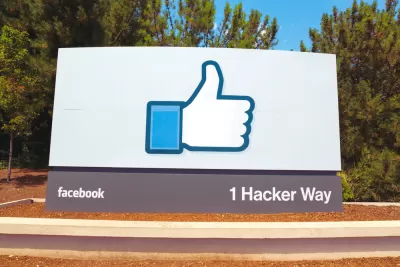Facebook has announced plans for a new kind of city, which will begin as a new digital layer over reality in Menlo Park, California before quickly spread over everything.

At a press conference announcing the creation of a new smart city concept called Zuckerburgh, Facebook founder and CEO Mark Zuckerberg touted the project's completely novel approach to city governance.
"What makes Zuckerburgh so smart, and why I'm so excited about it, is its use of technology," said Zuckerberg at the press conference. According to Zuckerberg, the development process of Zuckerburgh is grounded in Facebook's original intentions as a social media platform. "The infrastructure of Zuckerburgh is its social network, and the social network of Zuckerburgh is its infrastructure," said Zuckerberg.
As a primary demonstration of its potential to disrupt democracy, Zuckerburgh will generate revenue using a government financing innovation Facebook engineers have dubbed "data increment financing," based on less technologically advanced forms of value capture popular in less technologically advanced cities. "Basically as more data comes online, the value of all the data we're already collecting will increase," explained Zuckerberg. "We'll acquire that incremental increase in the value of the data and invest it back into civic spaces and quality of life investments in the social network—like faster advertisement delivery and a more targeted process for connecting landlords with desirable tenants."
For the pilot stage of the project, a Stanford email address will be necessary to sign up for Zuckerburgh. Eventually registration will be opened to a broader audience of universities and then to the broader public. "Eventually it's possible even your mom and her friends could be residents of Zuckerburgh," said Zuckerberg.
FULL STORY: April Fool's Day

Study: Maui’s Plan to Convert Vacation Rentals to Long-Term Housing Could Cause Nearly $1 Billion Economic Loss
The plan would reduce visitor accommodation by 25,% resulting in 1,900 jobs lost.

North Texas Transit Leaders Tout Benefits of TOD for Growing Region
At a summit focused on transit-oriented development, policymakers discussed how North Texas’ expanded light rail system can serve as a tool for economic growth.

Using Old Oil and Gas Wells for Green Energy Storage
Penn State researchers have found that repurposing abandoned oil and gas wells for geothermal-assisted compressed-air energy storage can boost efficiency, reduce environmental risks, and support clean energy and job transitions.

Santa Barbara Could Build Housing on County Land
County supervisors moved forward a proposal to build workforce housing on two county-owned parcels.

San Mateo Formally Opposes Freeway Project
The city council will send a letter to Caltrans urging the agency to reconsider a plan to expand the 101 through the city of San Mateo.

A Bronx Community Fights to Have its Voice Heard
After organizing and giving input for decades, the community around the Kingsbridge Armory might actually see it redeveloped — and they want to continue to have a say in how it goes.
Urban Design for Planners 1: Software Tools
This six-course series explores essential urban design concepts using open source software and equips planners with the tools they need to participate fully in the urban design process.
Planning for Universal Design
Learn the tools for implementing Universal Design in planning regulations.
Ascent Environmental
Borough of Carlisle
Institute for Housing and Urban Development Studies (IHS)
City of Grandview
Harvard GSD Executive Education
Toledo-Lucas County Plan Commissions
Salt Lake City
NYU Wagner Graduate School of Public Service





























